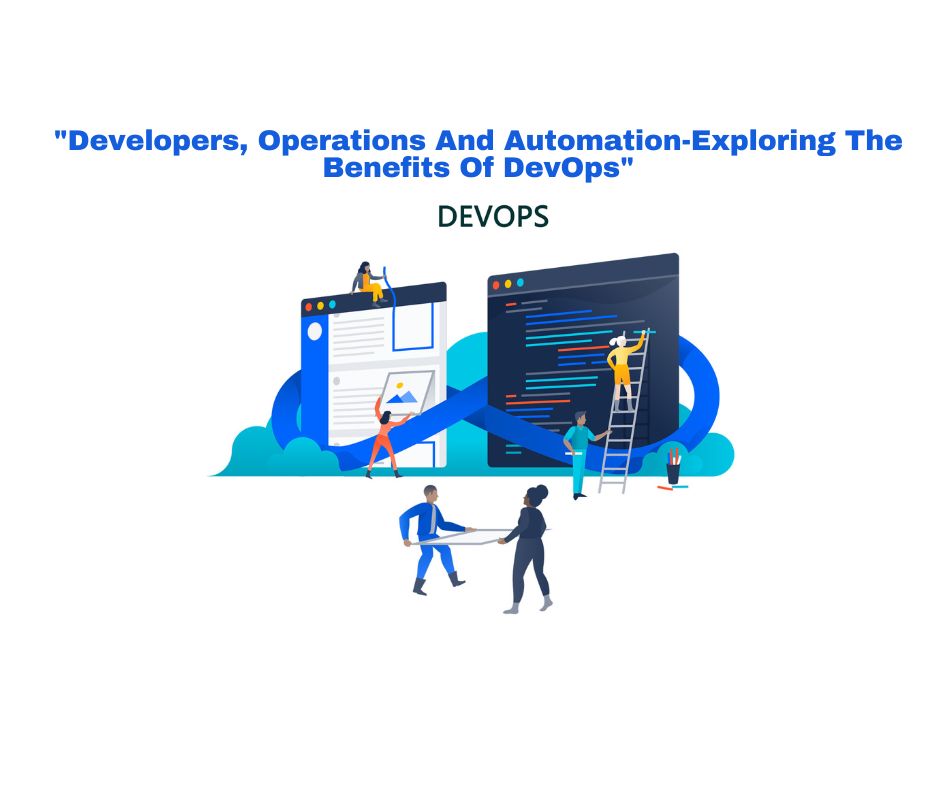“Developers, Operations And Automation-Exploring The Benefits Of DevOps”
5 min read
Last Updated on June 11, 2023 by Jonathan Lopez
What Is DevOps?
DevOps is a term that is often thrown around without much explanation. In this section, we will break down what DevOps is, its benefits, and the roles that development and operations play in its implementation.
First and foremost, It is a way of working that helps to bridge the gap between development and operations. This two-way communication allows for smoother collaboration between these two groups, which ultimately leads to better products and services. It also helps to improve security by ensuring that both development and operations are aware of changes that are happening on the network.
In terms of roles, It typically involves the involvement of both development and operations personnel. Development uses tools such as code versioning and Continuous Integration/Continuous Deployment (CI/CD) to create new features while ensuring they are correct before release. Operations then deploys these new features into production, monitoring the system closely for potential issues.
The future of DevOps looks promising thanks to the growing popularity of automation technologies such as Automation Tools for Java (ATJ). These tools help developers automate tasks such as building applications or deploying them into production, which cuts down on human error and makes work faster overall. As more companies adopt this approach to working, we can expect even greater benefits from DevOps in the years to come!
How DevOps Enhances Collaboration Between Teams
DevOps is a collaboration-friendly process that helps to improve the quality of code and speed up the development cycle. Its origins can be traced back to the early days of software development, but it has recently become more popular due to its many benefits. In this section, we will explore some of the key benefits of using DevOps in a development environment and discuss how it can help to improve collaboration between teams. The DevOps Training in Hyderabad program by Kelly Technologies can help to develop the skills needed to handle the tools and techniques associated with DevOps.
What is DevOps?
DevOps is short for “DevOps Infrastructure as Code”. It is a collaboration-friendly process that helps to improve the quality of code and speed up the development cycle. It automates many of the processes involved in software development, such as automated testing and deployment. This allows developers and operations teams to work together more effectively than ever before, resulting in higher quality products delivered faster.
How does DevOps improve collaboration between developers and operations teams?
One of the key benefits of using DevOPS is that it improves communication between these two groups. Automation tools can be use to streamline processes such as automate testing and deployment, which makes it easier for everyone involve to understand what needs to be done and when it needs to be done. This automation also reduces human error, leading to improved quality products faster than ever before. Additionally, by working together closely, developers and operations teams are better able to resolve issues quickly – which ultimately leads to better customer service experiences.
What automation tools can be used in a DevOps environment?
There are a variety of automation tools that can be use in a DevOps environment, including Puppet scripts, Chef recipes, or Ansible playbooks. These tools allow you not only automate tasks but also monitor progress so that everything runs smoothly on schedule. By automating important processes throughout the development process, you can ensure that everything runs as planned – without any human error! As with all things technological though there are best practices you should follow when implementing Automation Tools in your organization – we’ll explore some below!
The Benefits Of DevOps
DevOps is a term that is becoming increasingly popular in the software development industry. What is DevOps, and what are its benefits? In a nutshell, It is a collaboration model between development and operations teams that aims to speed up the time to market for new products. By integrating both teams into the development process, It allows for better communication and collaboration between them. This leads to faster time to market, improved quality control, and more efficient processes.
Beyond just improving the speed of product development, It also enhances security and consistency across systems. This means that your customers’ data remains secure, even if there are any issues with your development or operation teams. Additionally, it helps to reduce costs associated with developing and operating a software system.
Overall, It offers many benefits that can improve the customer experience as well as the efficiency of your development process. If you’re looking to improve your software system in any way – whether it’s speed or quality – then consider adopting DevOps into your workflow.
Reducing Time-To-Market With Automation And Collaboration
Developers, Operations, and Automation- Exploring the Benefits of DevOps.
DevOps is a powerful combination that can help to reduce time-to-market and improve quality and performance. As software development becomes more complex and reliant on automation, collaboration between development and operations teams is essential for success. In this section, we’ll explore some of the benefits of DevOps and highlight some strategies for integrating it into your workflow. We’ll also provide overviews of various automation tools and platforms that are available for DevOps. By understanding the benefits of DevOps, you can encourage collaboration between team members and better achieve your goals in faster timeframes.
Advantages of DevOps include streamlined processes that help to reduce overall cost while improving efficiency. By integrating automation into the workflow, you can create a more cohesive process that is easier to manage and understand. Additionally, by encouraging collaboration among development and operations teams, you can speed up product release cycles while maintaining quality standards.
This article in the blogstab must have given you a clear idea about Challenges that must be face when implementing DevOps include integrating automation into an existing process without disrupting functionality or causing chaos within the organization. To overcome these challenges, effective communication is key – both within individual teams as well as across organizational boundaries.






